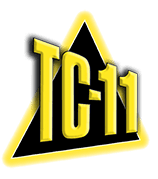Using TC-11© to Prevent Damage fromRoad and Ocean Salt
Did You Know TC-11 Also Restores Clouded Headlight Lenses?
The salt applied to roads in this part of the country is devastating to vehicle undercarriages. TC-11 Corrosion Inhibitor is superb at preventing corrosion damage from road salt. TC-11 is truly a remarkable product. There is nothing else as good on the market!
It is not uncommon to see significant corrosion on the undercarriage of new vehicles. This includes the rear axle, trailing links, and brackets. This is a picture of a NEW VEHICLE!
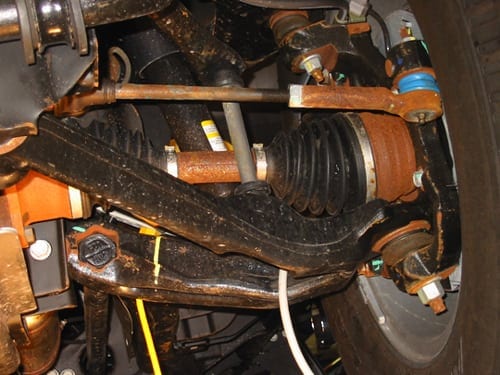
This is another photograph of a NEW VEHICLE!
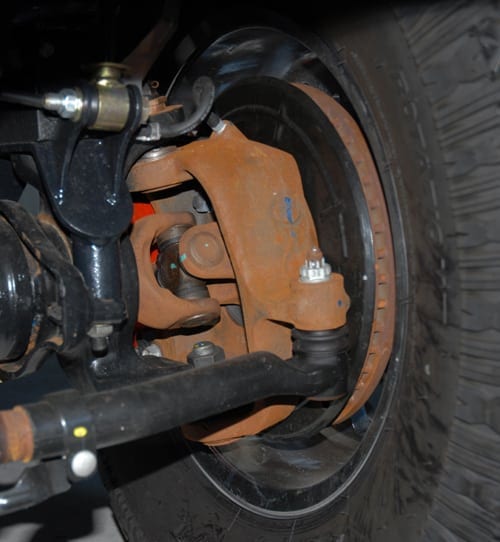
A photograph of a vehicle front suspension that has been exposed to salt on a regular basis is presented below.
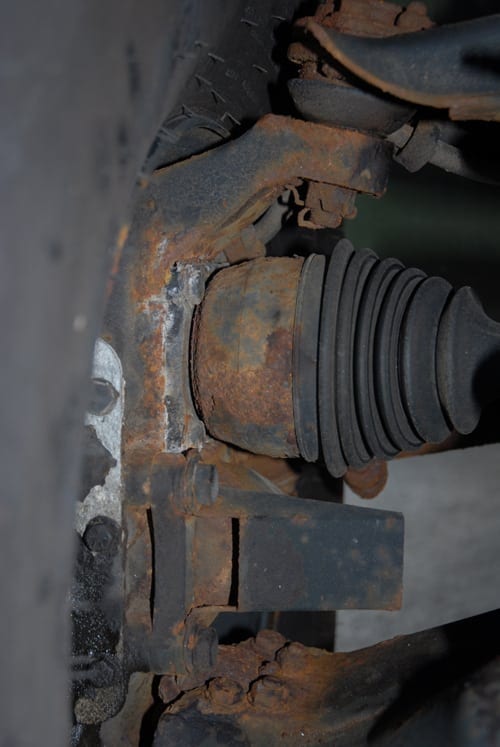
A photograph of a nine year old vehicle stored and operated and stored in the same environment and treated with TC-11 is presented below. This picture was taken six months after TC-11 was applied. This period included 45 consecutive days of rainfall. This is a picture of a NINE YEAR OLD VEHICLE!
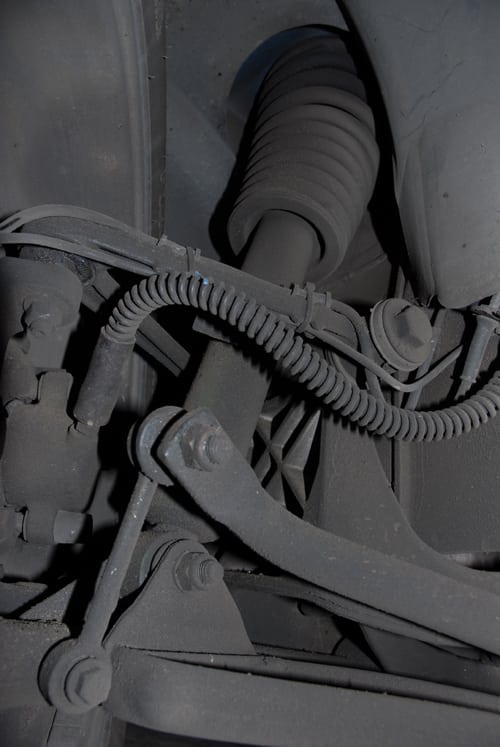
A photograph of an EIGHTEEN YEAR OLD VEHICLE that has been treated with TC-11 is presented below. This vehicle was operated and stored in a salt laden environment, and it was used to launch boats in salt water for eleven years.
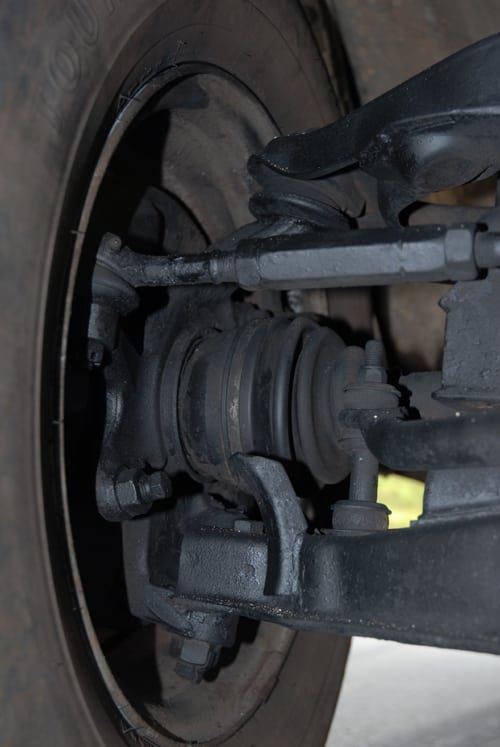
A picture of an under hood component treated with TC-11© is presented below. This vehicle is stored and operated in a salt laden environment. The component looks “like new”. All of the rubber and plastic components are soft and supple. This is a NINE YEAR OLD VEHICLE!
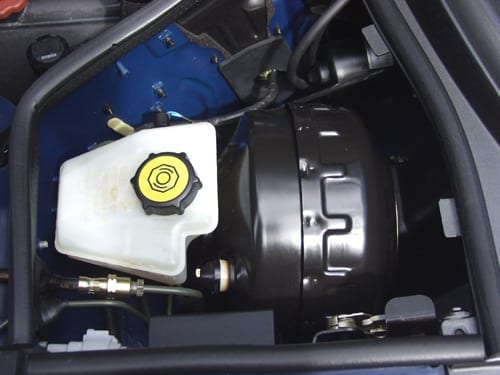
There is no question that ocean salt in coastal communities and salt used to control ice on highways causes serious corrosion damage to vehicles and equipment that is exposed to the salt mist.
Salt increases the rate of oxidation corrosion because of the presence of free chlorine molecules. Chlorine is a much stronger oxidizer than oxygen, which means that the rate of corrosion is faster if salt is present on the metal surface.
Salt also attacks paint. Both of the elements that make up salt – sodium and chlorine – are highly reactive. Chlorine has one of the highest oxidation potentials of any element, and sodium has one of the strongest reducing potentials of any element. The free chlorine or sodium molecules present in the salt film will do the damage, not the salt itself.
Salt increases the rate of electrolytic corrosion because the sodium and chlorine molecules that make up salt are highly effective at carrying electrons from metals with higher electrochemical potential to metals with a lower electrochemical potential. The salt solution that covers the undercarriage allows electrons to migrate from one end of the car to the other.
The salt on large flat undercarriage surfaces is eventually washed off with rainwater or a car wash. The salt that has penetrated into micro-spaces such as bolt threads or cable housings is virtually impossible to remove, even with highly effective products such as Salt-Away.
If TC-11 is applied to the undercarriage and drive train before the salt mist, the TC-11 penetrates into the micro-spaces first and the salt cannot penetrate into the micro-space as long as the film of TC-11 is maintained.
TC-11 can displace salt, but salt cannot displace TC-11. This means that if TC-11 is applied to the undercarriage after the salt mist, the TC-11 is still highly effective in preventing corrosion.
The fact that some of the TC-11 may washed off of the undercarriage by rainwater or car washes does not affect the overall effectiveness of TC-11. The portion TC-11Car Coat that is in the micro-spaces such as bolt threads or between leaf springs is doing the “real work” as far as long term corrosion control is concerned.
TC-11 will stop existing rust. The TC-11 will isolate the corrosion from the atmospheric oxygen supply and salt.
TC-11 is not a major source of concern to car wash operators because from a wastewater treatment perspective it is no different from the motor oil and lubricating grease that is normally found on vehicle undercarriages . An oil/water separator is highly effective in removing any TC-11 that enters the rinse water. An oil/water separator or the equivalent is part of every car wash water treatment system, so this is not a major concern from car wash operator an environmental standpoint.
Application Procedure
TC-11 is applied with a low pressure sprayer such as those manufactured by Hudson Weed’n Bug Eliminator® Sprayers or Ace Hardware. item number 71967.
1. Shake container well.
2. Transfer container contents to low pressure sprayer.
3. Spray vehicle undercarriage and drive train. If you see alternating dull and shiny areas you are not applying enough material. If you see drips you are applying too much material.
4. Allow TC-11 to dry for 20 minutes before exposing vehicle to wet roads.
Repeat this process every four months.
TC-11 is not an undercoating, which means that it may be applied to threaded fittings and moving parts such as the emergency brake cable. Undercoating is a tar like material, and if you apply it to threads is will make it very difficult to remove the nut unless the threads are cleaned thoroughly. This is not the case with TC-11. TC-11 is optimized for threaded fittings and moving parts such as brake cables.
Do not apply TC-11 to disc brake rotors. The TC-11 will form a glaze on the brake pad and the pad will have a tendency to grab the first time it is used.
It is very easy to remove the TC-11 film.
We recommend a citrus based cleaner to remove TC-11. TC-11 does not recommend petroleum based degreasers. Petroleum based degreasers are so strong that they attack rubber, paint and plastic. Some are so strong that they will actually dissolve an aluminum container!TC-11 Discussion Older engines leaked a fair amount of oil. As the car aged, the seals used on areas such as the valve cover gasket and the oil pan gasket would harden, and oil would start to seep through the cracks in the sealant. This resulted in a messy engine compartment and undercarriage, but it was effective in controlling corrosion.
TC-11 Discussion
Older engines leaked a fair amount of oil. As the car aged, the seals used on areas such as the valve cover gasket and the oil pan gasket would harden, and oil would start to seep through the cracks in the sealant. This resulted in a messy engine compartment and undercarriage, but it was effective in controlling corrosion.
Modern seals are very effective in eliminating oil leaks. This means the engine compartment and undercarriage are usually completely oil free. This also means that the engine compartment and undercarriage are relatively clean, but they are subject to corrosion.
In the era of solid rear axles and leaf springs, there were not a lot of moving parts on vehicle suspension systems. With the widespread use of independent rear suspensions and coil springs, there are a lot of moving parts in a modern suspension system. TC-11 is ideal for lubricating these components.
Automobile manufacturers have focused on preventing rust from puncturing sheet metal components in order to meet warranty requirements. This is manifested in the extensive use of galvanized sheet metal components. Galvanized sheet metal is much more resistant to corrosion than un-galvanized steel and it is and excellent approach to corrosion control.
Steel is galvanized by depositing thin sheet of zinc on top of the underlying steel. If a small hole or crack forms on the layer of zinc and the underlying steel is exposed to a conducting fluid such as water, electrolytic action will cause the zinc in the adjacent area to be removed from zinc film and to be deposited on the exposed steel. Galvanized sheet metal is actually self-healing as long as enough zinc is available.
Manufacturers are also making rocker panels out of plastic. Rocker panels are one of the most corrosion prone parts of an automobiles, and plastic is an ideal material for this application.
TC-11 is optimized for lubricating the undercarriage and drive train, since it does not evaporate and it does not produce a wax film. The TC-11 film is quite unique, since it is a “non-hardening wax film”.
Caterpillar, Case, and John Deere dealers use TC-11 to prevent salt damage to their equipment which may cost as much as $500,000. They have been using TC-11 for five years, and they are insistent that every piece of equipment shipped out of the West Coast is treated with TC-11.
Call 808-220-2986 for pricing on 55-gallon drums.
